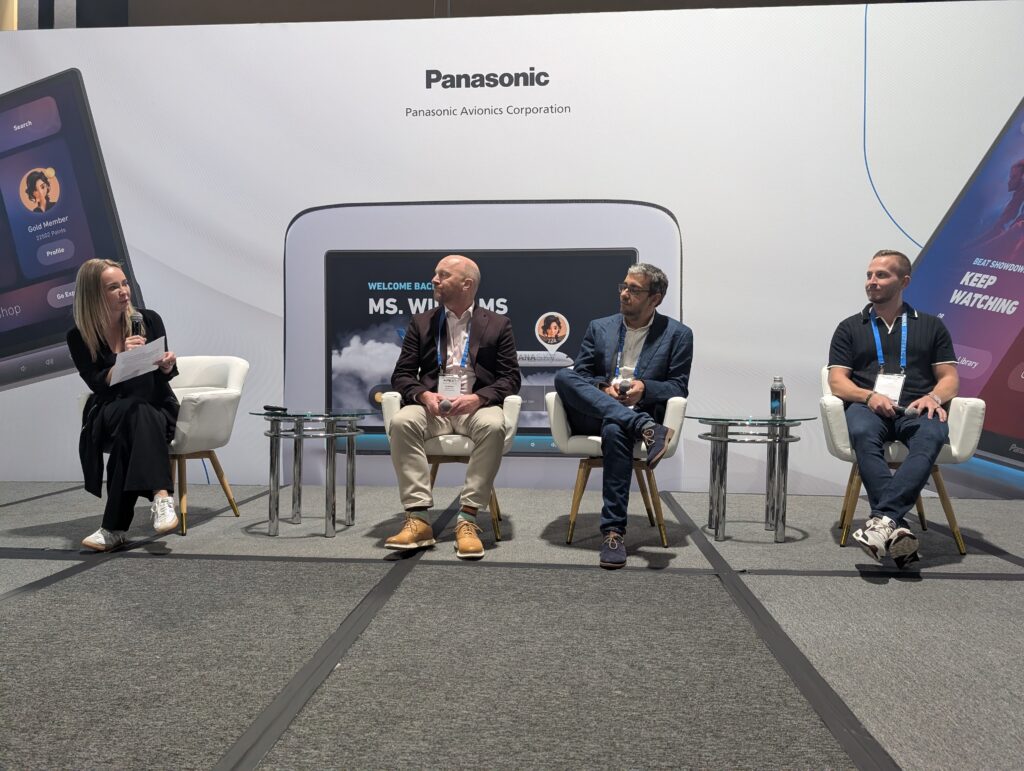IFE Evolution: Moving to Connected Journey Experiences
Share
The latest Inflight Entertainment (IFE) trends reveal a significant shift from traditional content delivery to sophisticated, psychology-driven passenger experiences.
This was the outcome of a panel discussion at APEX Global EXPO, moderated by Maryann Simpson, Director at Jetway Communications, which featured insights from three airline IFE leaders: Dominic Green, Director of In-Flight Entertainment at United Airlines; Miguel Ferreira, Digital Onboard Experience Manager for TAP Air Portugal; and Blake Rittenberg, Manager of In-Flight Entertainment, Tech and Partnerships at JetBlue. Each brought unique perspectives from their respective carriers’ approaches to passenger engagement and entertainment strategies.

According to the panel, airlines increasingly view their IFE platforms as integral parts of their digital ecosystem rather than standalone entertainment systems. “We’re really trying to evolve our IFE away from being purely a media player,” explained Dominic Green, Director of In-Flight Entertainment at United Airlines, who noted that United is deploying its newest platform across more than 30 aircraft in their mainline fleet.
Passenger psychology plays a crucial role in modern IFE strategy. Rittenberg pointed out that when in aircraft, passengers are “hurling through the air at 35,000 feet at 500 miles an hour.”
This understanding drives airlines to create experiences that help passengers feel more comfortable. Interestingly, flight map features have emerged as crucial comfort tools, with airlines reporting that an overwhelming majority of passengers engage with mapping products during flights. As Rittenberg explained, “It’s almost like an illusion of control. Being able to see how high you are, how fast you’re going, and how long until you arrive at your destination gives you this false sense of control.”
The streaming revolution has strengthened, rather than weakened IFE’s position. “IFE is actually like the last place on earth where you have all of this content from all of these streaming services living side by side,” Rittenberg pointed out, highlighting how fragmented streaming services have made IFE more valuable as a comprehensive entertainment hub.
Cultural identity and personalisation are becoming key differentiators. TAP Air Portugal has leveraged its platform to showcase Portuguese culture, launching initiatives like an exclusive onboard film festival and interactive wine tourism content. “With IFE, if you have the right redesign and the right functionalities, you can liberate the experience of content discovery,” noted Ferreira, adding that “passengers are not commenting on the mainstream; they are commenting on this niche content that makes a difference.”
Data analytics is revolutionising content curation and advertising strategies. Airlines are moving beyond traditional demographic targeting to create more nuanced, journey-specific experiences. United Airlines has implemented sophisticated data collection from its new platform. However, Green noted that understanding how passenger behaviour changes onboard still requires “a bit of an art and science to it.”
The challenge of creating interfaces that work for all generations has emerged as a critical focus area. JetBlue emphasises designing systems that accommodate digital and non-digital natives, ensuring all passengers can easily access features from basic entertainment to Wi-Fi connectivity.
Advertising within IFE systems is evolving toward more sophisticated, less intrusive models. Airlines are implementing targeting capabilities based on route, nationality, and passenger preferences while working to standardise advertising systems across the industry. “As an industry, we should standardise this… and make them (advertisers) feel it is easy to buy ads inside of our product,” Ferreira suggested.
Looking ahead, airlines are focused on creating more connected, personalised experiences throughout the entire journey. This includes pre-flight content previews, seamless continuation of viewing experiences, and better integration with airline apps and services. The emphasis shifts from pure entertainment to creating a comprehensive digital experience that enhances the travel journey.
The evolution of IFE systems reflects the industry’s broader move toward more personalised, data-driven passenger experiences. As airlines continue to invest in new technologies and partnerships, the traditional IFE system is transforming into a sophisticated platform that serves as a crucial touchpoint in the airline’s digital ecosystem.


